RDA TIGER
Research Data Alliance facilitation of Targeted International working Groups for EOSC-related Research solutions (RDA TIGER)
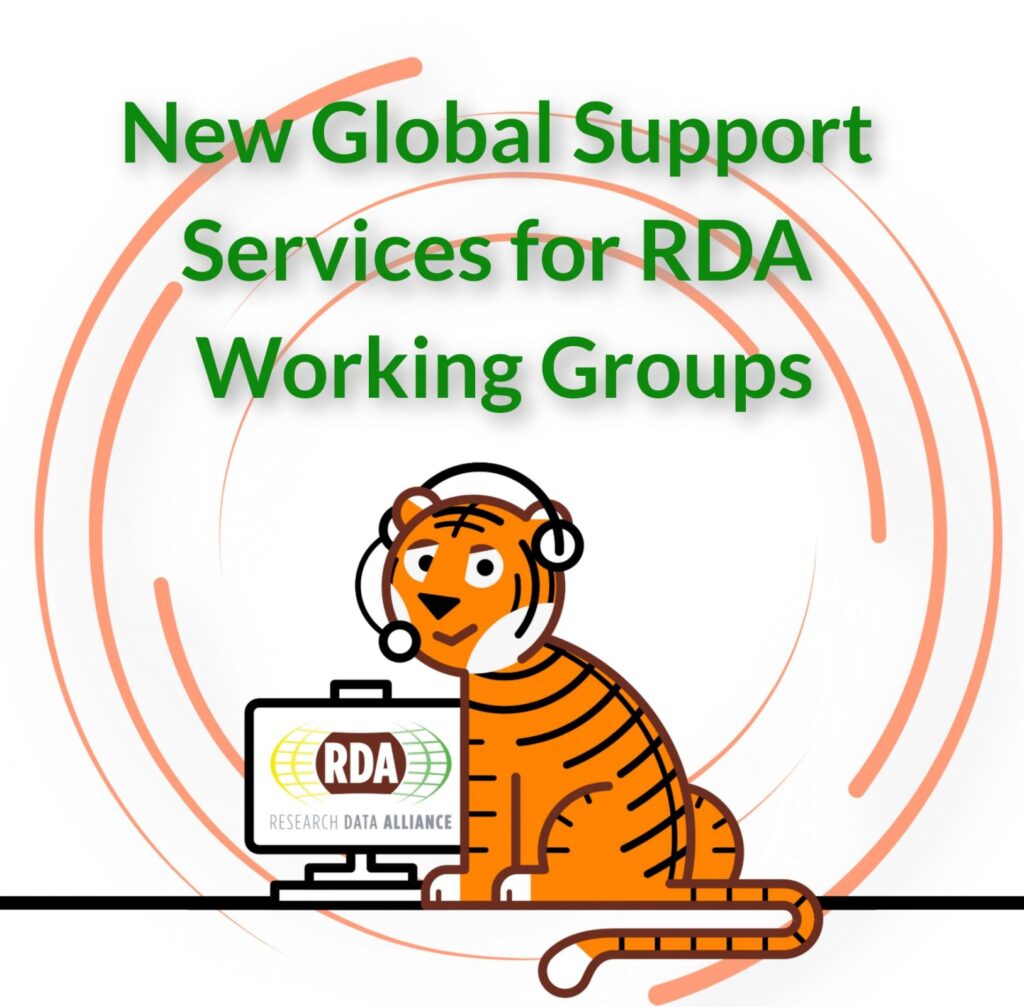
RDA TIGER is a new project tasked with providing support services for the Working Groups (WGs) within the Research Data Alliance.
Open Calls for RDA Support Services
This open call is seeking applications from existing or potential Research Data Alliance (RDA) Working Groups (WGs) that wish to receive RDA TIGER support for their WG activities. The call will be continuously open and has four selection rounds per year. Each round has a deadline by which the applications have to be submitted in order to be reviewed.
The continuously open call for WG support has been expanded to include additional support mechanisms. Please read below for information about new opportunities!
The deadline for applications for this selection round is Friday 31 May 2024, 23:59 CEST.
All RDA WGs or potential RDA WGs that apply to receive support should meet the eligibility criteria set out below and will be evaluated by a selection committee. This includes existing WGs that have established processes and membership, as well as new WGs requiring support to kickstart their activity. The RDA WGs supported have to run according to the RDA WG processes, procedures and policies.

RDA TIGER Services for supported RDA WGs
The RDA TIGER project team offers Facilitation, Communications Output Support and Landscape and Engagement Services. Find out more about the Services and read the service descriptions.
RDA TIGER support through the WG lifecycle
The project will provide services according to the stage of each WG throughout its lifecycle of eighteen months, from inception to completion:
- Upcoming Working Groups
The project can provide support in FACILITATING the forming the WG by finding WG members in coordination with the new active global engagement and LANDSCAPING analysis service, by helping to COMMUNICATE WG ideas widely and via offering practical help with case statement preparation and output definition.
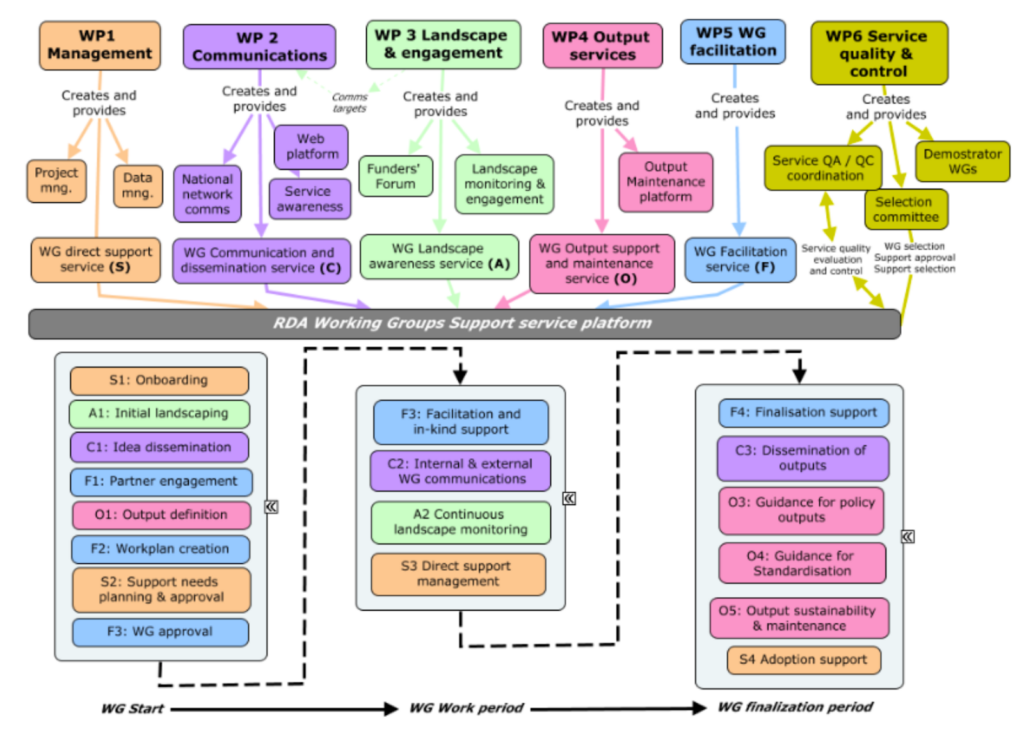
RDA TIGER Services per Work Package and Working Group stage. See also RDA Tiger Service description page
- Ongoing Working Groups
For ongoing WGs, the project will provide facilitation and ORGANISATION services, leading to reduced workload on the WG members and chairs, who can then in turn concentrate on providing their expertise. Other services include communication, writing and editing, and output development services, as well as providing THIRD PARTY GRANTS grants for output testing, development, travel and even external consultancy services.
- Ending/Finished Working Groups
For ending and finished WGs, the RDA TIGER will provide help on last-mile development and writing, output finalisation and adoption, guidance on potential standardisation pathways and help with the (upcoming) RDA Maintenance Facility maintained by DANS.
RDA TIGER Supported Groups
Community-based catalogue of requirements for trustworthy technical repository service providers (Pilot Group)
Intended output: Communication with several stakeholders have presented the CoreTrustSeal Board with a challenge. One important group of stakeholders are the providers of products and services which either directly provide technical systems for repositories or otherwise provide partnership and support. These actors have always been a critical part of the data ecosystem. The existing CoreTrustSeal Requirements and evidence expectations may be elaborated and/or extended to allow the assessment process to differentiate more clearly between 1) a specialist (i.e. domain/subjectbased) repository serving a defined designated community with a clear knowledge base 2) a technical repository service provider which could support bit-level preservation for either of the above across the data lifecycle (for example, deposit, secure storage, access). The proposed Working Group will produce a community-based catalogue of requirements for trustworthy technical repository service providers. Such a catalogue would provide the basis for a certification procedure for technical repository service providers within the EOSC and beyond.
Multilingual Vocabularies Alignment WG (Pilot Group)
Intended output: The WG intends to propose a methodology for the alignment of controlled vocabularies in many languages. The methodology will describe the various steps of the alignment process: selection of the controlled vocabularies, alignment through automated processes, manual curation and validation. The WG output will benefit the services providing searching tools (libraries, research infrastructures) and the researchers willing to describe their data in many languages. It is expected that the methodology will significantly increase the connections of controlled vocabularies in many languages. This will be measurable by the increased number of resources available in a single search engine, as they will allow searching resources in more languages. The impact will also be measurable by the number of resources described with a common controlled vocabulary. Depending on the technical capabilities of the services where the method will be implemented, it should be possible to properly compare the usage metrics of resources that use multilingual descriptors and those that do not.
Small Uncrewed Aircraft Systems Data WG (SUAS Data WG) (Pilot Group)
Intended output: Specifications for drone services and resulting data for research, and a demonstrator to show how these guidelines support the design and implementation of cloud-based infrastructures for SUAS data. The primary target audience are researchers working with data collected by SUAS platforms. The open nature of the guidelines will support interoperability which in turn is expected to lower entry barriers for SMEs as service providers for SUAS-based missions.
FAIRtracks WG: extending and adopting the FAIRtracks metadata exchange standard to enable discovery and use of genomic datasets from disparate sources directly in downstream tools and frameworks (Pilot Group)
Intended output: Provide end users (e.g. researchers, data analysts, AI processes) with unified discovery of datasets from new data repositories as well as access to the FAIRtracks ecosystem through new access points and software tools. Facilitate the adoption of FAIRtracks as a metadata exchange standard by a selection of data providers, integrated with their existing metadata standards and data repositories and bridging to specialized data portals and analysis tools
The Global Open Research Commons (GORC) International Model WG (Ongoing WG) (Pilot Group)
Intended output: The GORC WG is working to develop a roadmap for global alignment to help set priorities for Commons development and integration. In support of this roadmap, this International Model WG will collect and curate a set of attributes that will allow Commons developers to compare features across science clouds and commons. When relevant, the WG will also collect information about how existing commons are measuring success, adoption or use of their attributes and services within their organization, such as number or amount of data downloads, contributed software, and similar key performance indicators (KPI) and access statistics.
National PID Strategies WG (Ongoing WG) (Pilot Group)
Intended output: The National PID Strategies WG explores how PIDs form part of national policy implementation frameworks. There are systemic and network benefits from widespread and consistent PID adoption, and funders, government agencies, and national research communities have created PID consortia or policies (including mandates) in pursuit of these benefits.
Policies in Research Organisations for Research Software (PRO4RS)
The Policies in Research Organisations for Research Software (PRO4RS) Working Group is co-convened with the Research Software Alliance (ReSA) and aims to create a community of stakeholders involved in promoting and/or implementing policy that supports research software at the research institution level (e.g., universities, national laboratories). This will build on ReSA’s taskforce, Research institution policies to support research software, which is already building a collection of relevant institutional policies.
Harmonised terminologies and schemas for FAIR data in materials science and related domains WG
Coming soon
RDA/CODATA Data Systems, Tools, and Services for Crisis Situations WG
The principal objective of DSTS_CS-WG is to create a listing of the specific data-related needs and challenges arising during crisis situations mapped to data systems, tools, and services (DSTSs) indicating their applicability, interoperability, and utility, with reference to the data value chain.
Recommendations for FAIR data sharing in wind energy WG
See the WG homepage.
EOSC-Future/RDA Artificial Intelligence & Data Visitation Working Group (AIDV-WG)
The principal objective of AIDV-WG is to examine the promises, challenges, and barriers to the use of AI in data sharing and Open Science having regard to scientists and research institutions as well as to policy and the interests of patients, communities, health advocates, and those stakeholders otherwise underrepresented in these important initiatives for Open Science. Working to support the EOSC Future project and facilitate the implementation of EOSC across research communities, this AIDV-WG examines interoperability issues arising across federated and non-federated systems. Particular attention is given to national and institutional policies (ethics/legal) and how they affect the generation of metadata and interdisciplinary work and cooperation.
FAIR Data Maturity Model WG output maintenance/adopter mapping (WG to develop, align and implement policies on research software)
The RDA FAIR Data Maturity Model Working Group develops as an RDA Recommendation a common set of core assessment criteria for FAIRness and a generic and expandable self-assessment model for measuring the maturity level of a dataset. The aim is not to develop yet another FAIR assessment approach but to build on existing initiatives, looking at common elements and allowing the group to identify core elements for the evaluation of FAIRness. That will increase the coherence and interoperability of existing or emerging FAIR assessment frameworks and it will ensure the combination and compatibility of their results in a meaningful way.
The WG brings together stakeholders from different scientific and research disciplines, the industry and public sector, who are active and/or interested in the FAIR data principles and in particular in assessment criteria and methodologies for evaluating their real-life uptake and implementation level.
RDA/WDS TRUST Principles Outreach and Adoption Working Group
This Work Group focuses on the TRUST principles and aims to discover barriers and hesitation for implmentation and adoption of TRUST principles allowing for the reduction in ambiguiting and confusion about the relationship between TRUST principles, certification processes, and metrics of other princples frameworks (FAIR, CARE).
Building Immune Digital Twins WG
Coming soon
Get in touch
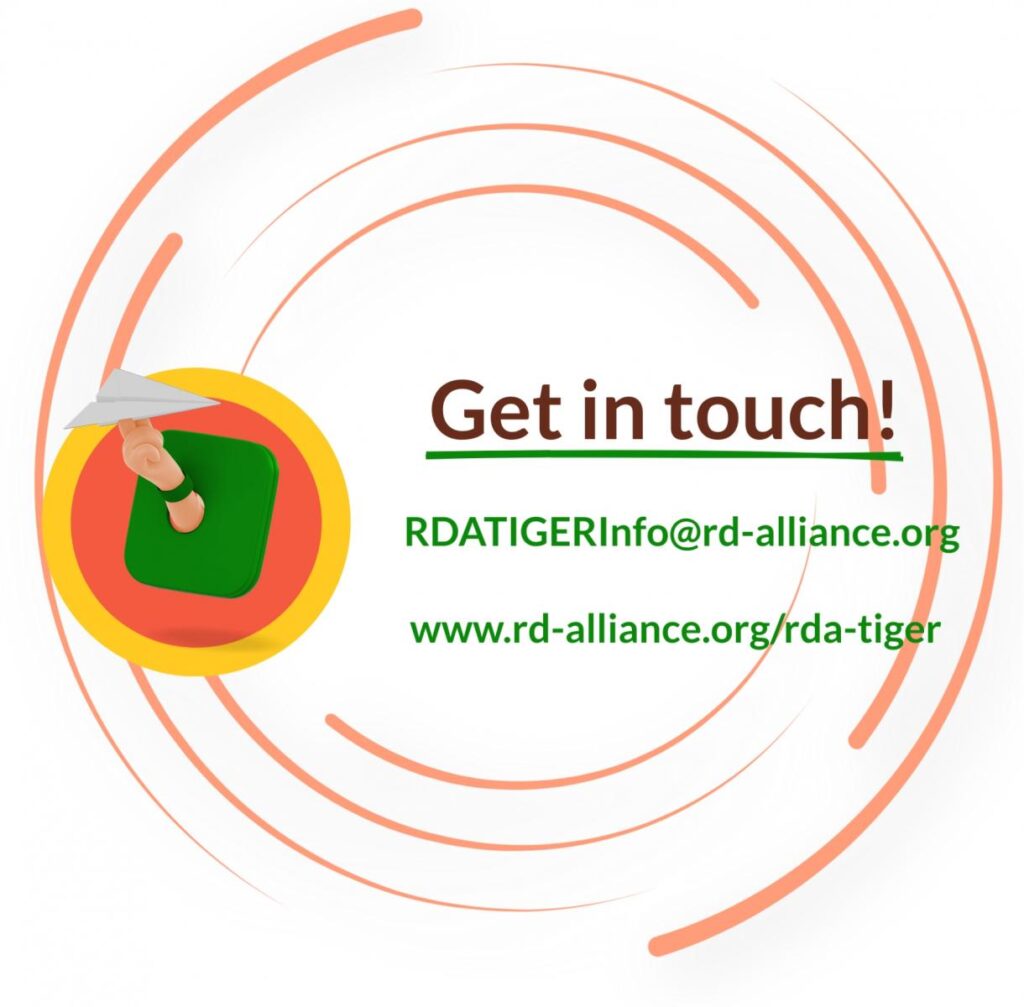
The RDA TIGER will support WGs based on application and transparent selection process. The basic support includes the facilitation, communication, output support and landscape analysis services, additional direct support (e.g. travel grants, 3rd party grants) are provided by separate application process. Details of these processes and application information are provided on a separate page.
The RDA TIGER team has been hard at work since the kick-off meeting preparing and defining the services offered to the WGs.
The first year of the project will focus on onboarding and piloting a number of pre-approved WGs. Following that, the RDA Community will be able to leverage RDA TIGER resources and services directly. The support services on offer will be provided following successful application.
If you are interested in finding out more about the upcoming services, please contact the RDA TIGER team:

RDA TIGER supporting EOSC
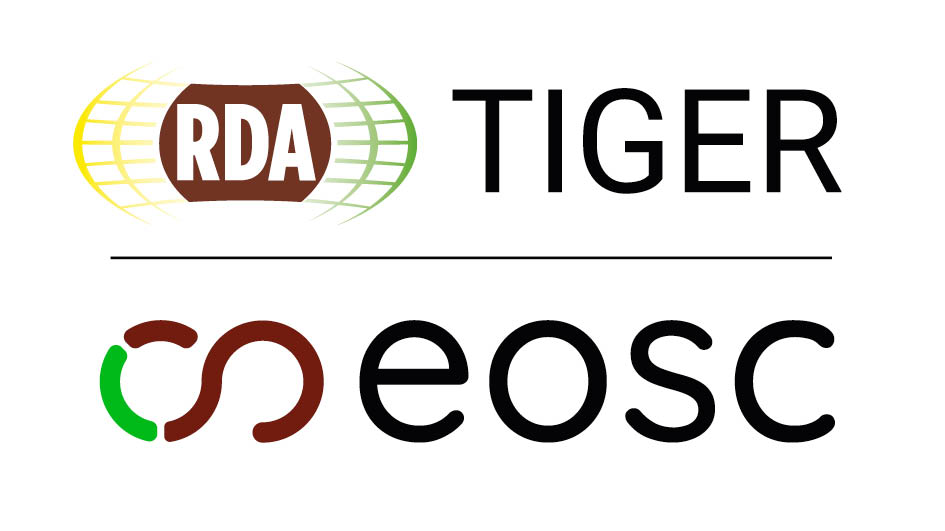
RDA TIGER supports Working Groups that concretely align, harmonise and standardise Open Science developments and technologies globally. The project is coordinated by the RDA-Association, with the Committee on Data of the International Science Council (CODATA), Netherlands eScienceCenter, and the Data Archiving and Networking Services (DANS) joining as partners. The services it provides will facilitate and support coherent and consistent working group definitions and increases the impact of the key European initiatives on the global level
The project will directly contribute to the European Open Science Cloud Partnership by supporting (via the Working Groups) the international engagement and alignment of policies, technologies, methodologies, practices and other outputs of EOSC-related and other European Open Science developments.
More about the RDA
Please click the image below to view the RDA flyer
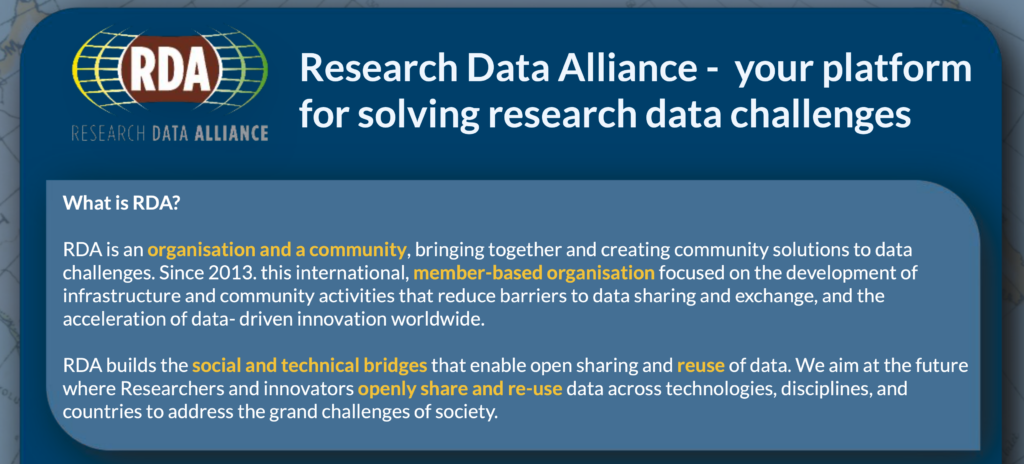

Funded by the European Union through grant 101094406.
